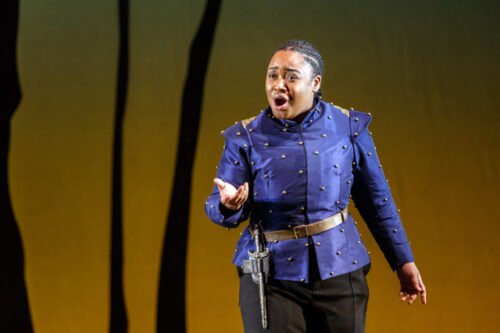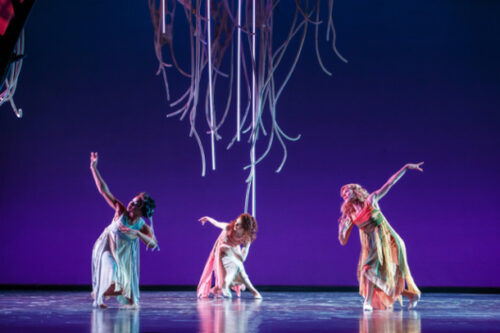 United States Handel, Ariodante: Soloists, Chatham Baroque / Anthony Walker (conductor). Pittsburgh Opera, CAPA Theater, Pittsburgh, 21.4.2023. (RP)
United States Handel, Ariodante: Soloists, Chatham Baroque / Anthony Walker (conductor). Pittsburgh Opera, CAPA Theater, Pittsburgh, 21.4.2023. (RP)

Production:
Director – Crystal Manich
Sets – Ningning Yang
Costumes – Grace Kang
Lighting – Cindy Limauro
Choreographer – Michael Pappalardo
Cast:
Ariodante – Jazmine Olwalia
Ginevra – Emily Richter
Polinesso – Chuanyuan Liu
Lurcanio – Daniel O’Hearn
Rè di Scozia – Evan Lazdowski
Dalinda – Julia Swan Laird
Dancers – Tori Casagranda, Savionne Chambers, Julia Wasilewski#
Pittsburgh Opera’s production of Handel’s Ariodante is a delight. The cast, drawn from the company’s Resident Artist Program, brings stylish singing and youthful zest to one of opera’s great dramas. Music is not the only means through which emotion is expressed in this production, however, as director Crystal Manich uses color and light to equal effect.
The plot of Ariodante is taken from Ariosto’s epic Orlando Furioso, in which Ginevra, the daughter of the Scottish king, is betrothed to Ariodante who has a rival in Polinesso. With the unwitting assistance of Dalinda, Polinesso dupes Ariodante and the king into believing that Ginevra has been untrue. The distraught Ariodante vanishes, and rumors circulate that he jumped into the sea.
Polinesso seizes the opportunity to win Ginevra as his wife by defending her honor in mortal combat. His opponent is Lurcanio, Ariodante’s brother, who is in love with Dalinda. Victorious in battle, Lurcanio is united with Dalinda, and Ariodante reappears to claim Ginevra as his own.
Ningning Yang has created an environment of moveable, one-dimensional, tree-like cutouts and suspended fixtures for the production. Intertwined in the hangings are tubular lights, which can change color in an instant, as can the entire stage. Lighting is an integral part of this production, and Cindy Limauro’s ability to capture emotion in color has the twin virtues of being effective and subtle.
If the production’s sensibilities tilt towards a timeless modernity, the costumes anchor it in the past. Grace Kang’s designs, especially the flowing dresses for the women and the crown that sits on the king’s head, evoke the romance and gallantry of knights in shining armor and damsels in distress.
Shorn of a couple of minor characters and some music, this Ariodante runs just shy of two-and-a half hours. (Most recordings clock in at well over three hours.) The pruning did no harm to the narrative flow of the opera while retaining the best of Handel’s most sublime score.
As Ariodante, Jazmine Olwalia sang with virtuosity, agility and rich tone. Ariodante’s ‘Scherza infida’ was a heartfelt expression of grief that was as moving as it was beautiful. Handel, however, lavished his creative genius to a far greater degree in the music that he composed for Ginevra who, after all, is the character around whom the action revolves.
There is a radiance and lighter-than-air quality to Emily Richter’s soprano that was ideally suited to Handel’s alluring melodies. Richter’s trills and runs were exquisite, but it was her ability to caress a long, spinning phrase that was truly special. Her singing in ‘Il mio crudel martoro’, Ginevra’s expression of despair after she has been falsely accused of infidelity and told of Ariodante’s death, was as moving as it was lovely.
Bass-baritone Evan Lazdowski brought dignity to his role as king and father. His sonorous voice showed to its best advantage in the king’s farewell to his daughter, ‘Al sen ti stringo e parto’. Dalinda suffers much the same emotional trajectory as does Ginevra in the opera, and Julia Swan Laird’s silvery lyric soprano was as effective in expressing joy as it was sorrow.
Polinesso and Lurcanio are the dramatic and vocal counterweights to the other characters in the opera. They are men of action, and the music Handel wrote for them is forthright and bold, just the type of roles for countertenor Chuanyuan Liu and tenor Daniel O’Hearn.
Chuanyuan Liu’s Polinesso was as broadly drawn dramatically as it was skillfully etched vocally. His countertenor is more fine-grained than piercing, but the flare and intensity with which he sang matched the dastardly glint in his eye. Daniel O’Hearn’s stand-and-deliver approach to his foe was matched by his forthright singing. He is a tenor spelled with a capital ’T’.

At Covent Garden, where Ariodante premiered in January 1735, Handel had the use of a troupe of dancers imported from the Paris Opera. Michael Pappalardo’s choreography, as danced by Tori Casagranda, Savionne Chambers and Julia Wasilewski, provided visual interest as well as another means to express emotion in movements as graceful and light as any of Handel’s vocal lines.
In the pit were members of Chatham Baroque, Pittsburgh’s internationally acclaimed early music ensemble. The musicians played with the verve and passion for which they are renowned. The stirring tones of the brass, although deployed sparingly, lent a particularly martial flare to the performance, which was led by Anthony Walker, the Pittsburgh Opera’s music director.
Rick Perdian
